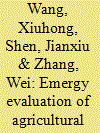| Srl | Item |
| 1 |
ID:
128382


|
|
|
|
|
| Publication |
2014.
|
| Summary/Abstract |
China's grain-for-green policy (GFGP) was implemented with the goal of improving ecological security. Consequently, agricultural energy and agrochemical inputs have been significantly increased to improve food security and to increase the income of farmers in the regions where the GFGP was implemented. In analysis of the sustainability of the agricultural system affected by the GFGP, it is essential to consider both economic profitability and environmental sustainability. Using Yanchi County as a case study area, this study used an emergy synthesis to examine the sustainability of the agricultural system before and after the GFGP in Northwest China. We found that the total emergy input and energy output of the agricultural system in the study area increased from 1991 to 2008; however, the sustainability of the system declined, and this decline was especially evident after the GFGP was launched in 2001. Increasing inputs of non-renewable purchased resources will not only reduce the effectiveness of the GFGP in Northwest China, but also hinder the implementation of the energy-saving and emission-reduction policy that China launched in 2005. We suggest that sustainable agricultural development in Northwest China should be based on effective use of renewable resources and development of a low-carbon agricultural economy.
|
|
|
|
|
|
|
|
|
|
|
|
|
|
|
|
| 2 |
ID:
146079


|
|
|
|
|
| Summary/Abstract |
Since the early twentieth century, reforms of the social institution of marriage in China have profoundly curtailed the power of the senior generation to influence the marriage decisions of their offspring. Yet the marriage considerations of graduates from economically deprived rural family backgrounds in China's northwestern Gansu Province reveal a definite impact of feelings of social obligation towards the family as well as of a local understanding of marriage market stratification which (also) reflects these obligations. In this rural region, higher education mainly aims at long-term upward mobility into the formal urban sector of the economy. After all, the basic ‘citizenship divide’ between rural and urban residence rights established by the socialist hukou (household registration) system continues to determine rural families’ structural exclusion from access to various urban resources. Feelings of indebtedness for financial and other support received from parents and family members during years of higher education entangle graduates from economically deprived rural family backgrounds in webs of social relations that oblige them to also consider the interests of others when deciding on whom to marry. When choosing a marriage partner they thus often face dilemmas of negotiating material versus emotional interests, as well as collective versus individual ones. While higher education empowers them to reject others’ interference in their marriage decisions, if they do so, they have to cope with feelings of having disappointed all the hopes their supporters invested in them.
|
|
|
|
|
|
|
|
|
|
|
|
|
|
|
|